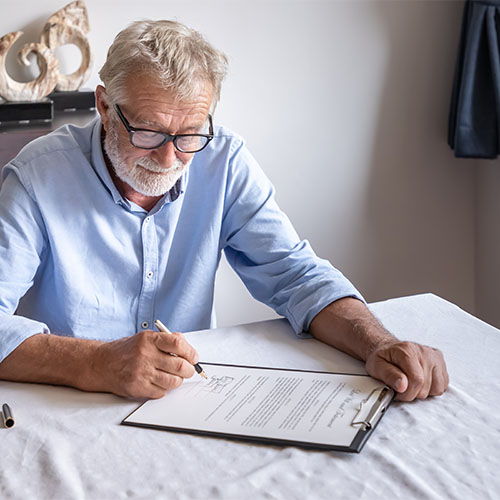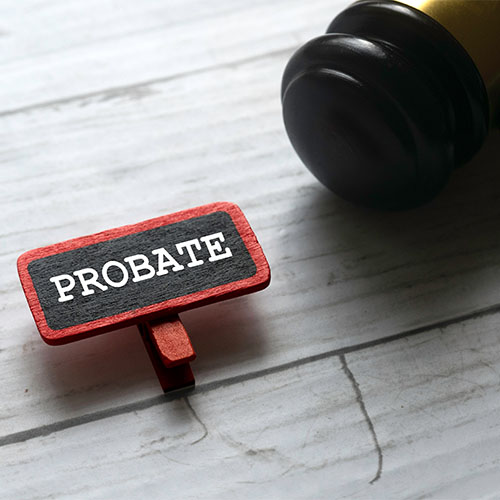The Ultimate Guide
1 Locating the original Will
When applying for Probate, the original Will is required. Often, people think that they are in possession of the original Will, but only have a copy. Usually the original has been kept elsewhere for safekeeping and is with the solicitors who prepared the Will, or in Safe Custody at a Bank.
Probate Consultants Tip
You can check if you have the original Will by looking at the signatures to see if they have been written in pen. The trick to this is to hold up the Will in front of a direct light source. If the signatures have been written in pen, there will be a slight indentation on the opposite side of the page. If not, the signatures are most likely a copy, indicating that the Will is not the original.
If the Will is not the original, executors must track down where the original is located.
If the Will was prepared by lawyers, it is very likely being held at the law firm that made the Will, in which case the executor can request for it to be released.
If the Will is not with lawyers, executors can check with the following institutions to discover whether the Will has been deposited for safekeeping:
- Banks where the deceased held accounts
- A trustee company like the State Trustees in Victoria
- The Supreme Court
If the original Will cannot be found, you can still apply for Probate using a copy of the Will. This application is more complex and most executors opt to engage a lawyer for assistance.
3 The Executors are unable or unwilling to apply for Probate
There are situations where executors named in the Will are unable or unwilling to apply for Probate.
- Unable: They have died or have lost mental and/or physical capacity.
- Unwilling: The executor doesn’t want the responsibility of applying for Probate and administering the deceased estate.
What happens in this situation depends on whether there have been substituted executors named in the Will, and the wording used in the Will outlining when they can step in and apply.
There are two types of executors named in a Will:
- Instituted executors: The primary executors named in a Will
- Substituted executors: Executors that step in under specific situations – usually where the instituted executors are unable or unwilling to apply (see above).
Not all Wills name substituted executors, and where they do, the substituted executor clause must be read carefully to clarify when they can step in. In most cases, the instituted executor has died before the testator (person who made the Will). In other cases, the instituted executor may have lost mental capacity or has refused to apply for Probate. If the Will has covered for these conditions, the substituted executor can step in.
Evidence of the incapacity or renunciation of the instituted executors must be supplied in the Probate application. Sometimes, proof of death of an instituted executor is also required – but not in every state.
Where the instituted executors cannot, or will not, apply for Probate and there are no substituted executors named in the Will (or those that are named cannot, or will not, apply for Probate), an application for Letters of Administration with the Will annexed can be made. This is usually made by the beneficiary with the largest interest in the estate.
5 The deceased was known by multiple names
When dealing with a deceased person’s estate, many executors notice that they were known by a variety of names and that different names appear on different documents. Names are the foundation of Probate applications because the application largely deals with the identity of the deceased person.
Where the deceased had different names, this must be addressed in the Probate application to ensure that the Court grants the application and that once Probate is granted, the executors can deal with all the assets in the estate.
If Probate is granted in the deceased’s true and correct name but does not include the names that they owned assets in (these are known as aliases), then the asset holder may deny access to the assets.
Probate Consultants Tip
Executors should check the spelling of names on every document carefully and note all differences – even where it is a minor spelling mistake. Any name differences must be specifically addressed in the Probate application and reconciled for the Court.

7 The Probate application was not advertised correctly
In Victoria, New South Wales, Queensland, Tasmania, Australian Capital Territory and the Northern Territory executors must advertise their intention to apply for Probate for 14 clear days before the application can be reviewed by the Court.
The advertisement, also known as a Probate Notice, notifies the public that you are applying for Probate and serves many purposes, including allowing any interested party the opportunity to block the application through a Caveat. It also provides information for creditors to contact the executor to advise of any debts they are owed by the estate.
The Advertisement/Notice plays an important role in the Probate application process and must be completed accurately and correctly.
Advertisements usually address the following:
- Which executors are applying for Probate
- Which executors are not applying for Probate and why
- Why any instituted executors are not applying, and whether substituted executors are applying instead
- Name differences for executors and the testator
- Any codicils (formal documents amending the original Will)
If the advertisement is not published correctly, it must be re-published with the correct information and executors will have to wait another 14 days before the application is reviewed.
If you align to applying for Probate as an SRA, contact Probate Consultants today for a Free Consultation.
9 A requisition is raised
Once your Probate Application is lodged with the Court, it will be reviewed within the specified time for that State or Territory – anywhere between 5 days and 12 weeks.
If the Court finds an issue with the application, it will issue a Requisition. This is a formal request for information required before the Court will grant Probate. The answers to the Requisition must often be provided by way of Affidavit evidence.
Common forms of Requisitions are:
- The Will has not been signed correctly, and an Affidavit of Due Execution is required
- The Will was translated and evidence of that translation must be provided
- The Will was signed during a period when the deceased was suffering from Alzheimer’s or Dementia, and testamentary capacity must be proved by obtaining evidence from the deceased’s treating doctor
- The Testator signed the Will a few days before passing, and testamentary capacity must be proved
- The advertisement was not published correctly
- There are staple marks on the original Will, indicating that the original binding of the Will has been removed.









